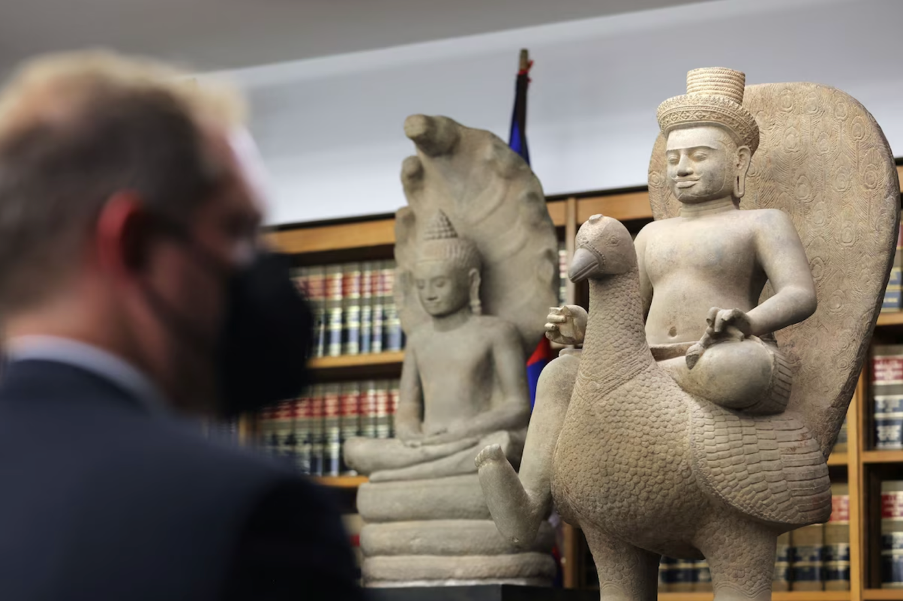Bert Demarsin and Marie-Sophie de Clippele in his thought-provoking work ” Pioneering Belgium: Parliamentary Legislation on the Restitution of Colonial Collections,” delve into the multifaceted origins of these historical artifacts[1]. It overviews The Restitution Bill, passed on 3rd July 2022. This Bill marks a significant milestone for Belgium as it takes a leading position in the global efforts to address the colonial past’s impact. The bill aims to acknowledge the transferability of goods associated with Belgium’s colonial history and establish a legal framework for their restitution and return, making the country a trailblazer in the field of colonial collection restitutions on the international stage. However, the situation ‘is not all roses’ and ‘the relative lack of procedural rules renders the process less transparent and more political’[2].
At the heart of the matter lies the burning question of restitution versus repatriation. While the former seeks to repair the wounds of individuals and countries that bore the brunt of colonial exploitation, the latter shifts responsibility to the nations or states, making it a matter of international significance. From the echoes of commerce and missionary activities to the adventures of scientific expeditions and the shadows of looting, the tapestry of colonial heritage is woven with captivating stories waiting to be uncovered.
Yet, navigating the legal labyrinth of restitution and repatriation proves to be no small feat. The absence of a binding international legal framework, exemplified by the UNGA Resolution 3187 of 18 December 1973, creates a daunting complexity that challenges our ability to right historical wrongs[3]. The non-retroactive nature of post-colonization conventions further complicates the matter, often leaving domestic private laws in Western collections as the guiding force, obscuring clear paths to rightful restitution.

Figure 1: A 10th-century sandstone statue of the Hindu god Skanda is among the 30 items that were returned to Cambodia. (Andrew Kelly/Reuters) Images sourced from: https://www.washingtonpost.com/nation/2022/08/09/united-states-cambodia-looted-art/
But as the world grapples with the legal complexities, a moral awakening begins to emerge. The concept of “excuse” takes centre stage in the dialogue, signifying a growing recognition of the need to address historical injustices with sincerity and empathy. Guido Gryseels’ work on the return of Colonial Heritage adds fuel to the fire, stirring hearts and minds with stories of Belgian companies that amassed wealth from Congo through the bustling port of Antwerp, leading to a call for estimates on the profits made during that turbulent era[4].
The debate over restitution and reconstitution further stirs emotions. Should cultural heritage be physically returned to its place of origin, or is the creation of symbolic replicas a viable compromise? Belgium, as a symbolic gesture, has legally provided a mask on long-term loan to Congo, where only 27 such masks exist globally, presenting a captivating example of cultural diplomacy in action.
To propel the conversation forward, a significant workshop in Dakar during April 2023 sought to foster partnerships between African and European museums[5]. Themes of empowerment, exhibitions, and collections are at the forefront, tackling crucial issues of conservation standards, insurance, transport, narrative, and capacity outreach. However, infrastructure and storage capacity emerged as major challenges, casting a spotlight on the urgent need for practical solutions.
Amidst these discussions, the haunting notion of power displacement theory emerged, revealing the profound historical imbalances of power that have coloured the acquisition and possession of colonial heritage. As we confront the ghosts of the past, we are prompted to reflect on the need for genuine collaboration and meaningful action, respecting the rights and cultural significance of the countries of origin.
The quest for provenance restitution and the return of colonial heritage is not merely a legal conundrum; it is a moral journey that calls for empathy, understanding, and compassion. As we embark on this quest, we must bear in mind the weight of history and the shared responsibility to reshape the future, ensuring that these priceless cultural artifacts find their rightful place in the tapestry of humanity’s collective heritage.
About the author: Alexandra Taylor is a paintings conservator. She is currently a Fellow at Stichting Restauratie Atelier Limburg (SRAL). Prior to this she has worked internationally, holding positions at Saltmarsh Paintings Conservation in Cambridge and the Phoebus Foundation in Antwerp. Her interests lie in the treatment of Old Masters and the fundamental aspects of paintings analysis, research, and the valorisation of results. Alexandra received her conjoint BFA(h)/BA at the University of Auckland (NZ) and MA in Cultural Materials Conservation at the University of Melbourne (AUS). She is a 2019 GAF Fellow at the International Specialised Skills Institute in Melbourne (AUS). Her Fellowship investigated current practice in preventing art crimes in conservation with the Association for Research into Crimes Against Art (IT).
Disclaimer: this article is intended for educational purposes, and does not purport to provide legal advice. The views and opinions expressed are those of the author.
Bibliography:
[1] Demarsin, B., de Clippele, M-S (2022). Pioneering Belgium: Parliamentary Legislation on the Restitution of Colonial Collections, sourced 23 July 2023 from < https://www.researchgate.net/publication/367065633_Pioneering_Belgium_Parliamentary_Legislation_on_the_Restitution_of_Colonial_Collections>
[2] Demarsin, B., de Clippele, M-S (2022). Pioneering Belgium: Parliamentary Legislation on the Restitution of Colonial Collections, p. 324.
[3] UNGA Resolution 3187, sourced 23 July 2023 from <http://www.worldlii.org/int/other/UNGA/1973/150.pdf
[4] Delputte, L (2021), ‘Looted Art Must Return to Congo, but How?’ in The Low Countries. Sourced 23 July 2023 from <https://www.the-low-countries.com/article/looted-art-must-return-to-congo-but-how>
[5] The AfricaMuseum signs the Declaration of Dakar (2023), sourced 23 July 2023 from <https://www.africamuseum.be/en/about_us/partnerships/declaration_of_dakar>

